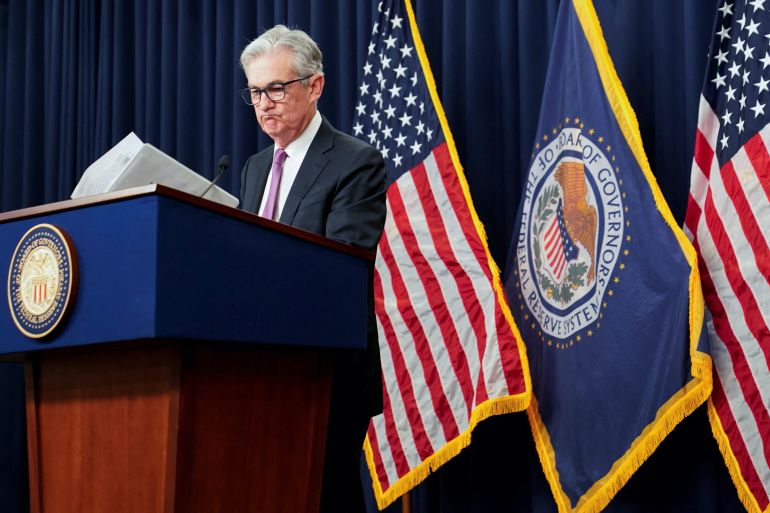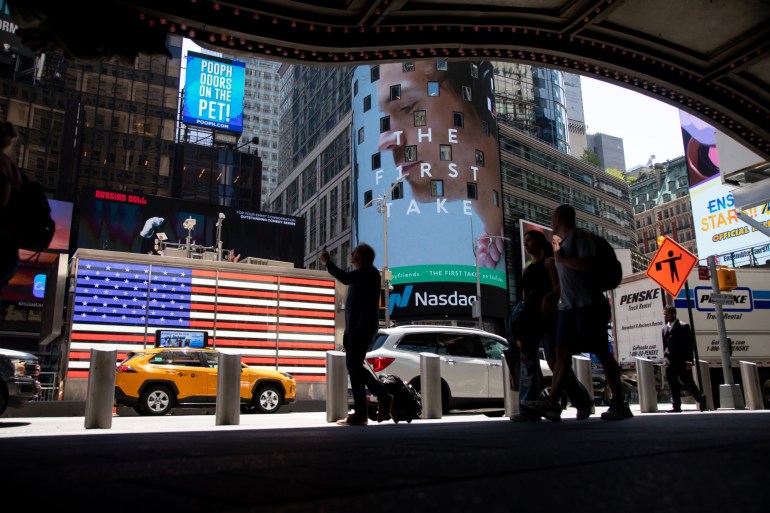Fed hikes rates by 75 basis points for 2nd straight month
Fed policymakers have a tightrope to walk as they struggle to cool red-hot consumer prices without slowing economic growth.

The Federal Reserve on Wednesday raised interest rates by 75 basis points for the second time in as many meetings as the US central bank doubled down on fighting the highest inflation in more than 40 years.
“The current picture is plain to see. The labour market is extremely tight, and inflation is much too high,” US Federal Reserve Chair Jerome Powell said at a news conference following the decision.
Keep reading
list of 4 itemsBank of Canada raises rates by full point to curb inflation
Five things to know about inflation and how it is affecting us
‘Irresponsible’ to cut back aid now: Q&A with UNDP’s Steiner
“While another unusually large increase could be appropriate at our next meeting that is a decision that will depend on the data we get between now and then. Our overarching focus is using our tools to bring demand into better balance with supply in order to bring inflation back down to our 2 percent goal.”
US inflation jumped 9.1 percent in June from a year earlier, the largest gain since 1981. The Fed raised rates by 75 basis points at its June meeting. Its next meeting is scheduled for September.
The bank’s policymakers are in a tough spot as they seek to strike a balance between cooling red-hot consumer prices without slowing economic growth.
Speaking to reporters, Powell did acknowledge that US growth and consumer spending has slowed significantly, activity in the housing sector has weakened, and business fixed investment looks to have declined in the second quarter.
“The Fed will continue to increase the cost of capital for an already slowing economy,” Peter Essele, head of portfolio management at Commonwealth Financial Network, a Massachusetts-based firm, told Al Jazeera.
Megacap growth stocks have been hammered this year. The S&P 500, a vital indicator of Wall Street’s confidence, entered a bear market in 2022, having suffered its worst first six months since 1970. Cryptocurrencies have plummeted, with the world’s largest digital coin, Bitcoin, losing more than 55 percent this year.
The pandemic-era housing boom is cooling fast. US pending home sales fell in June by the most since April 2020, according to data released Wednesday.
“Early signs of a cooling effect are most evident in the housing market, a sector that’s been severely impacted by rising mortgage costs,” Essele added.
American shoppers’ sentiment has taken a major hit in recent months. The Consumer Confidence Index fell for a third month straight to 95.7 from a downwardly revised 98.4 reading in June – the lowest reading since February 2021.

Walmart issued a profit warning on Tuesday, sending its stock down nearly 9 percent and spreading fear that the industry bellwether’s downgrade may be a prediction of what’s to come for the wider retail sector.
But by Wednesday, rosy outlooks from both Microsoft and Alphabet sparked a rally in high-growth stocks.
Microsoft Corp gained 6.30 percent by late afternoon on the heels of the Fed’s announcement after it forecast revenue would grow by double digits this fiscal year. Google’s parent company Alphabet Inc added 7.68 percent on better-than-expected sales.
Amazon.com Inc, Meta Platforms Inc and Apple Inc all gained as well. The tech giants are scheduled to release earnings data later this week.
Recession? Depends on who you ask.
Economists, for the most part, agree that the overall US economy is slowing. But they differ on how deep the slowdown will be.
Some warn that continued Fed tightening and interest rate increases the risk of tilting the already-fragile pandemic recovery into a full-blown recession. Others point to a robust labour market – although there are signs that it is slowing – and say that it is difficult to claim a recession when the US unemployment rate is at a historically low 3.6 percent.
The Department of Commerce on Thursday will release new gross domestic product (GDP) numbers. Two quarters of growth contraction informally signals that the economy is stuck in a downturn.
But the Biden administration has said not necessarily.
“Two negative quarters of GDP growth is not the technical definition of recession,” national economic adviser Brian Deese said during Tuesday’s White House news briefing.
President Joe Biden continues to insist that the economy is in good shape.
“We’re not going to be in a recession, in my view,” Biden said Monday. “My hope is we go from this rapid growth to steady growth.”